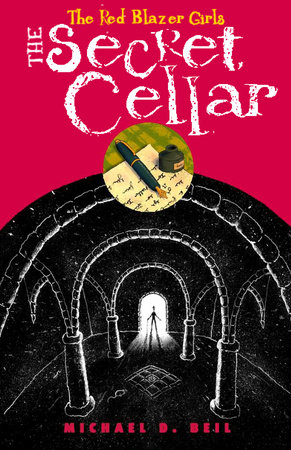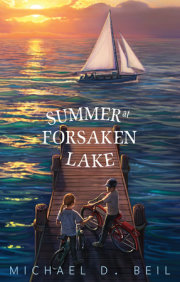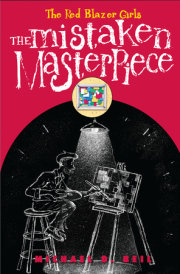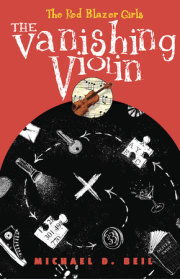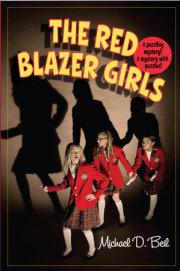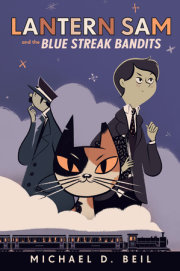One does not argue with Fate, the Red Blazer Girls Code, or Andrew Jackson
I'm peeking through an opening in the threadbare velvet curtain that leads into the tiny storefront parlor of Madame Zurandot, who, according to the flashing neon sign in the window, is both PSYCHIC! and CLAIRVOYANT! Two of my fellow wearers-of-the-red-blazer, Rebecca Chen and Leigh Ann Jaimes, look over my shoulders and nudge me inside.
"I can't believe we're doing this. Maybe it's not such a good--" I say as four hands give me a final push. A combination of smells, none of them particularly pleasant, greets me: vanilla incense, mothballs, and, somewhere in the distance, slow-cooking cabbage. Before me is a small round table that looks exactly as I had imagined it would. Seriously, Madame Zurandot has a crystal ball.
"Can I help you?" a voice asks from behind another curtain.
Gulp.
Ten minutes earlier, the three of us had been enjoying a chilly December Saturday in Manhattan, doing a little Christmas shopping and dreaming of the long school vacation, just two weeks away. On most Saturdays, Leigh Ann (the beautiful, graceful one) had dance class, and Becca (talented, artistic) had art lessons, but they were both on break until January. Only Margaret Wrobel (genius, absolute best friend in the world) had plans; besides being the smartest person I know, she's also a future violin superstar and takes lessons from my mom every Saturday, rain or shine, vacation or no vacation.
I spotted it first, a microsecond before Rebecca but enough to beat her to it. Lying there on the sidewalk in front of Madame Zurandot's, folded neatly in fourths, was a twenty-dollar bill!
"Well, hello, Mr. Jackson," I said, unfolding it and holding it up to make sure it was the genuine article.
"Sophie St. Pierre, you are the luckiest person I know," said Leigh Ann. "I don't think I've ever found a quarter."
"What should we do with it?" I asked. "I mean, it's found money. We have to spend it."
"You could buy lunch," Rebecca suggested. "I'm getting hungry."
Leigh Ann shook her head. "No, you should spend it on something for yourself. Or for Raf."
Raf--as in Rafael Arocho--is my boyfriend-who-I'm-not-allowed-to-call-a-boyfriend-until-I'm-sixteen.
"No, no, no," protested Rebecca. "Absolutely not. The rules in this situation are clear: if you find money when you're with other Red Blazer Girls, the money must be shared."
"What rules?" Leigh Ann asked. "You're making that up."
"Actually, she's right," I admitted. "And it's even my rule. Last summer, before you started hanging out with us, I found a five in the park one day--"
"What! You found a five, and now a twenty! That is so not fair," said Leigh Ann.
I shrugged. "I can't help it. It just . . . happens. But I told Margaret and Becca that it was only right to share. The Red Blazer Girls Code, I guess."
"I have an idea," said Becca, pointing at the sign in Madame Zurandot's window. "First visit, twenty dollars. It's fate. We have to do it."
"A psychic? Are you crazy?" I said.
"What, you don't believe in them?" Becca asked.
"I, uh, no. Yeah, no. I mean, I'm not sure. Margaret says it's a bunch of hooey."
"Oh, jeez. I should have known," Becca scoffed. "So what if Miss Scientific Method doesn't believe. How often do you have a chance like this? Even Margaret would have to admit that having twenty bucks just drop out of the sky the exact moment that you're standing in front of a sign that says FIRST CONSULTATION $20 is just . . . I mean, what are the odds?"
I had to admit, she had something there.
"Okay, but we don't tell Margaret. She'd be so disappointed."
"You have a serious problem," said Becca.
I didn't disagree.
A young woman--twenty at most, and dressed in jeans and a Lady Gaga T-shirt--appears from behind the curtain. Not at all what I'm expecting from a psychic. But then, maybe she knew that, and changed into those clothes just to catch me off guard. Pret-ty darn clever, these psychics.
"Hi," I say. "I, er, we were wondering if we could, you know, get a, um, reading. But if you're not . . . ready, we can come back later."
"Oh, yer lookin' for ma," she says, laughing. "She's the psychic. Have a seat. I'll get her for ya." She goes back through the curtain. "Ma! Ya got cust-a-muz!"
My eyes dart nervously from Becca to Leigh Ann to the ominous-looking crystal ball as we wait for Madame Zurandot.
"You should go first, Becca," I say. "It was your idea."
"Yeah, but you found the money," she says. "And I don't think she's going to tell all our fortunes for twenty bucks."
The curtain parts again and, following a dramatic pause, Madame Zurandot glides into the room as if she's on roller skates. (She's wearing a peasant skirt that drags on the floor, so, for all I know, she might actually be wearing skates.)
Without a word, she takes my fingers into her own cold, chapped hands and stares straight into my eyes for a full ten seconds without blinking. Then she closes her eyes and says, in an accent that I can't place, "I see a black dog running across an open field. You are trapped in a small room. And an old man with a cane, a man who is not who you thought he was, stands before a blue door with the number nine on it. And I see romance. . . . But wait! I see an enemy who becomes a friend, and a friend who becomes an enemy."
Okay, I'll admit it: I am freaking out as she finally breaks away from me and roughly grabs Leigh Ann's hands.
"Someone you love--someone who is far, far away--is waving to you from a boat. You are kneeling on a cold stone floor in the dark, searching for something that has been hidden away for many years. A girl in a red coat hands you a message. . . . I see the letters, but I'm afraid I cannot read the words; it is in a language I do not understand."
Rebecca's turn. Madame Zurandot takes her hands into her own and squeezes so hard that Becca opens her eyes wide. "You are standing alone in the midst of great beauty--a museum, perhaps. There is a single window on one wall, and when you look through it, you see a dead man, facedown at his desk, his pen still in his hand."
She drops Becca's hands and slumps down into a chair, her eyes closed and palms flat on the table.
The three of us stand there for a long time, waiting for her to say or do something. It's getting awkward, and just as I'm about to clear my throat to remind her that we're still in the room, she suddenly blurts out, "Others seek the same treasure you do, and though your quest may become dangerous, you must not give up. Be careful who you trust."
She opens her eyes and looks up at us, her face expressionless. "And that is all I see."
"Ummm . . . yeah," Becca says. "About those things you saw. Are those all things from the past? Or are they things that haven't happened yet?"
One corner of Madame Zurandot's mouth turns up into a half smile. "That is a question I cannot answer. Perhaps you will find more money on the sidewalk another day and you will return."
I feel my mouth fall wide open. "Wait. How did you--"
"Duh. She's psychic," says Becca, earning herself a slug in the arm.
"Look to the stars," adds Madame Zurandot mysteriously. "The answers are in the stars."
Copyright © 2012 by Michael D. Beil. All rights reserved. No part of this excerpt may be reproduced or reprinted without permission in writing from the publisher.

